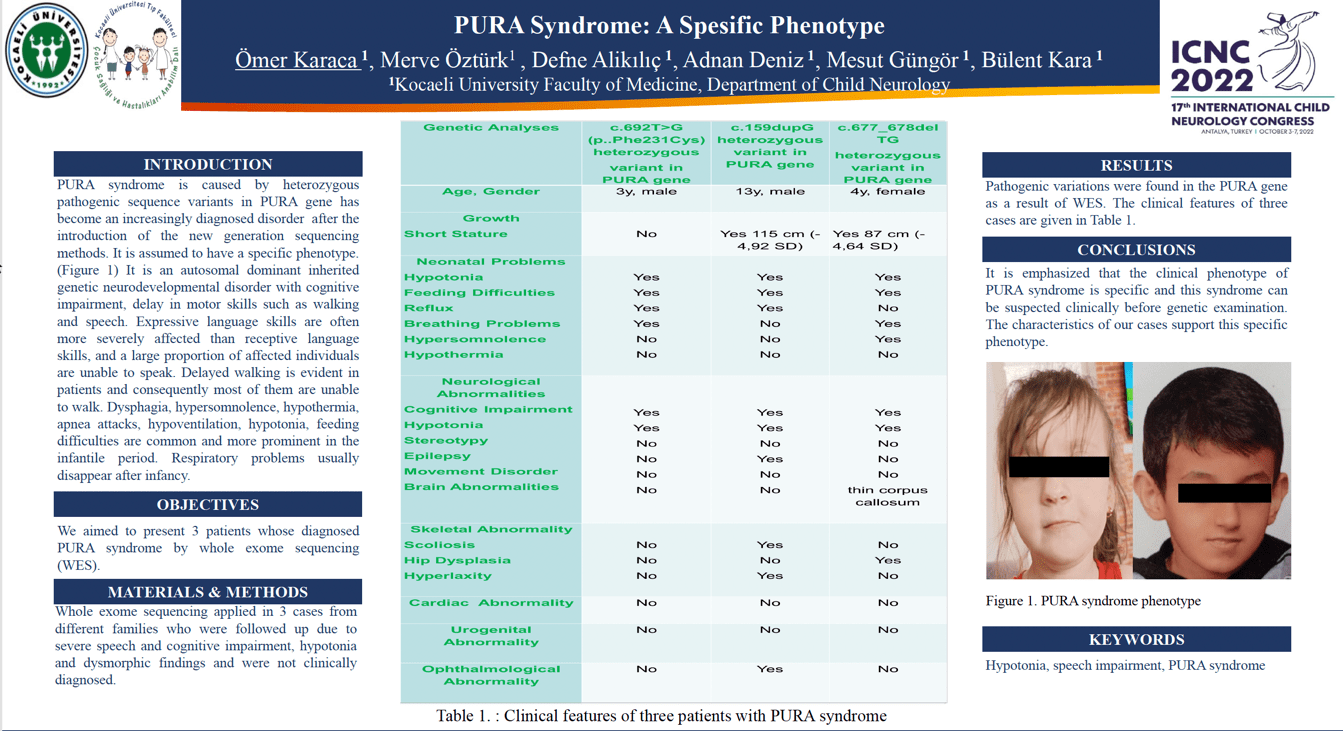PURA Syndrome: A Specific Phenotype
Ömer Karaca, Merve Öztürk, Defne Alikılıç, Adnan Deniz, Mesut Güngör, Bülent Kara
Objectives: PURA syndrome has become an increasingly diagnosed disorder after the introduction of the new generation sequencing methods. It is assumed to have a specific phenotype. It is an autosomal dominant inherited genetic neurodevelopmental disorder with cognitive impairment, delay in motor skills such as walking and speech. Expressive language skills are often more severely affected than receptive language skills, and a large proportion of affected individuals are unable to speak. Delayed walking is evident in patients and consequently most of them are unable to walk. Dysphagia, hypersomnolence, hypothermia, apnea attacks, hypoventilation, hypotonia, feeding difficulties are common and more prominent in the infantile period. Respiratory problems usually disappear after infancy. We aimed to present 3 patients who diagnosed PURA syndrome by whole exome sequencing (WES).
Methods: WES applied in 3 cases from different families who were followed up due to severe speech and cognitive impairment, hypotonia and dysmorphic findings and were not clinically diagnosed.
Results: Pathogenic variations were found in the PURA gene as a result of WES. The clinical features of three cases are given in Table 1.
Conclusion: It is emphasized that the clinical phenotype of PURA syndrome is specific and this syndrome can be suspected clinically before genetic examination. The characteristics of our cases support this specific phenotype.
Keywords: hypotonia, speech impairment, PURA syndrome
Ömer Karaca
Kocaeli University
Turkey
Merve Öztürk
Kocaeli University
Turkey
Defne Alikılıç
Kocaeli University
Turkey
Adnan Deniz
Kocaeli University
Turkey
Mesut Güngör
Kocaeli University
Turkey
Bülent Kara
Kocaeli University
Objectives: PURA syndrome has become an increasingly diagnosed disorder after the introduction of the new generation sequencing methods. It is assumed to have a specific phenotype. It is an autosomal dominant inherited genetic neurodevelopmental disorder with cognitive impairment, delay in motor skills such as walking and speech. Expressive language skills are often more severely affected than receptive language skills, and a large proportion of affected individuals are unable to speak. Delayed walking is evident in patients and consequently most of them are unable to walk. Dysphagia, hypersomnolence, hypothermia, apnea attacks, hypoventilation, hypotonia, feeding difficulties are common and more prominent in the infantile period. Respiratory problems usually disappear after infancy. We aimed to present 3 patients who diagnosed PURA syndrome by whole exome sequencing (WES).
Methods: WES applied in 3 cases from different families who were followed up due to severe speech and cognitive impairment, hypotonia and dysmorphic findings and were not clinically diagnosed.
Results: Pathogenic variations were found in the PURA gene as a result of WES. The clinical features of three cases are given in Table 1.
Conclusion: It is emphasized that the clinical phenotype of PURA syndrome is specific and this syndrome can be suspected clinically before genetic examination. The characteristics of our cases support this specific phenotype.
Keywords: hypotonia, speech impairment, PURA syndrome
Ömer Karaca
Kocaeli University
Turkey
Merve Öztürk
Kocaeli University
Turkey
Defne Alikılıç
Kocaeli University
Turkey
Adnan Deniz
Kocaeli University
Turkey
Mesut Güngör
Kocaeli University
Turkey
Bülent Kara
Kocaeli University

Ömer Karaca
Kocaeli University Turkey
Kocaeli University Turkey